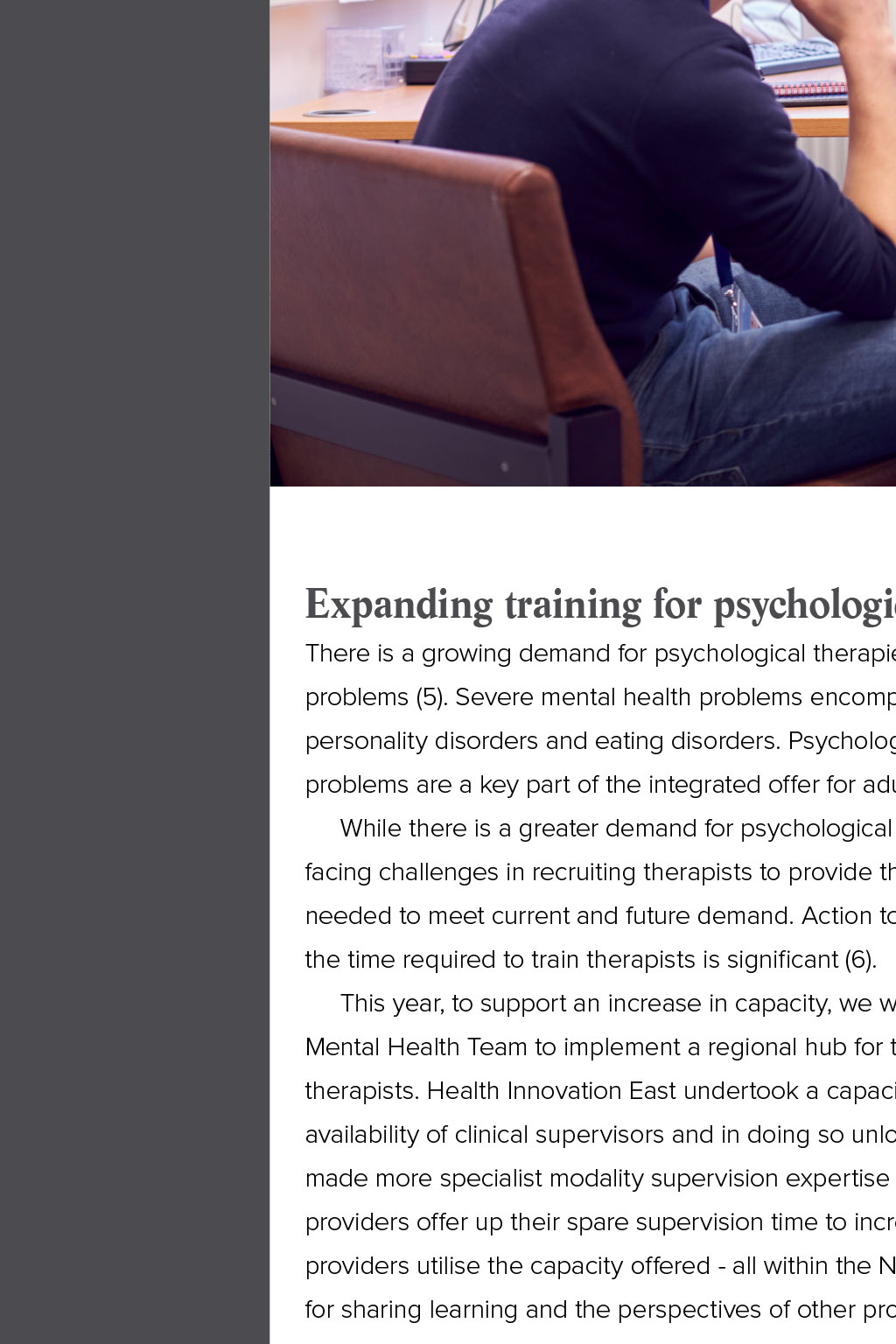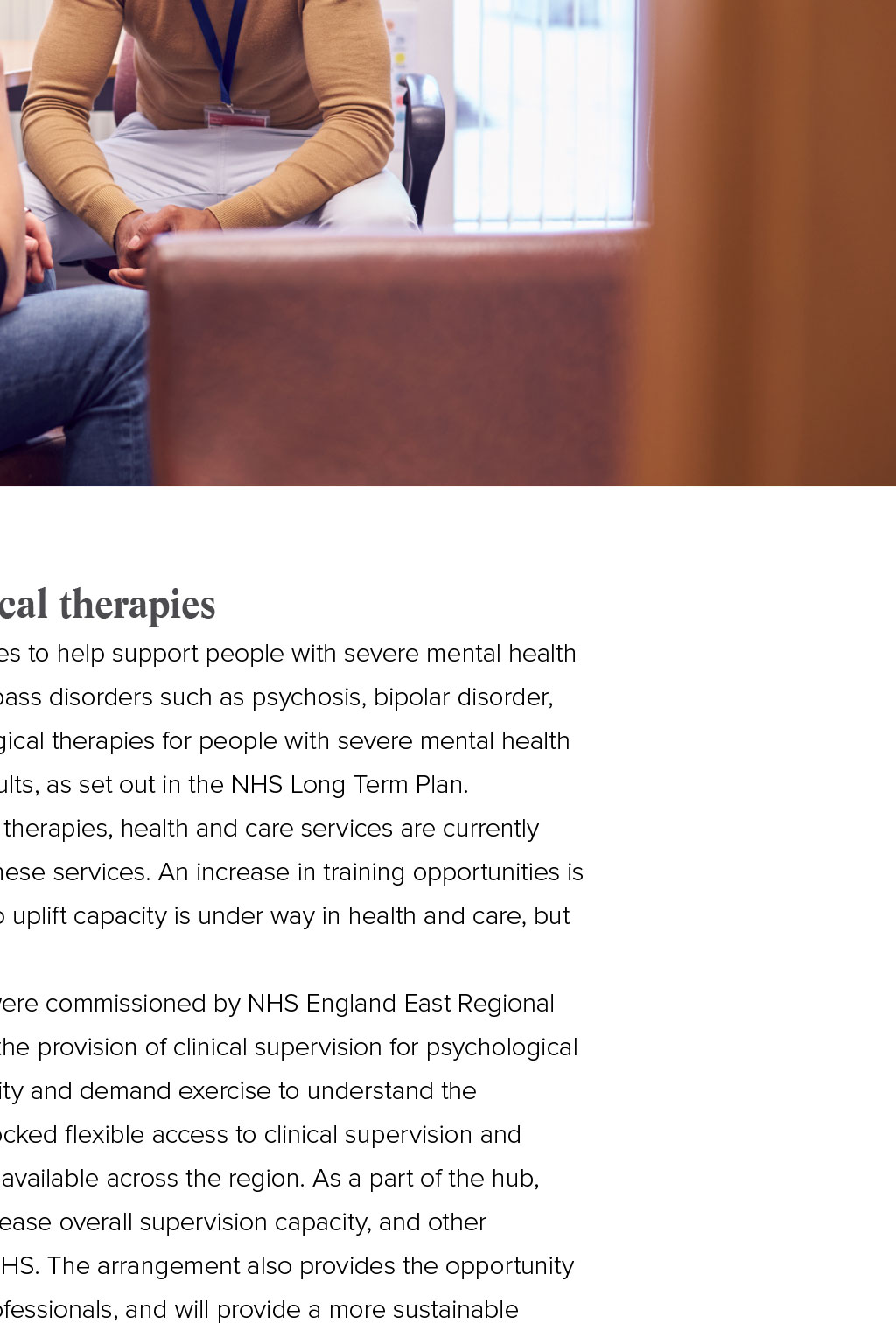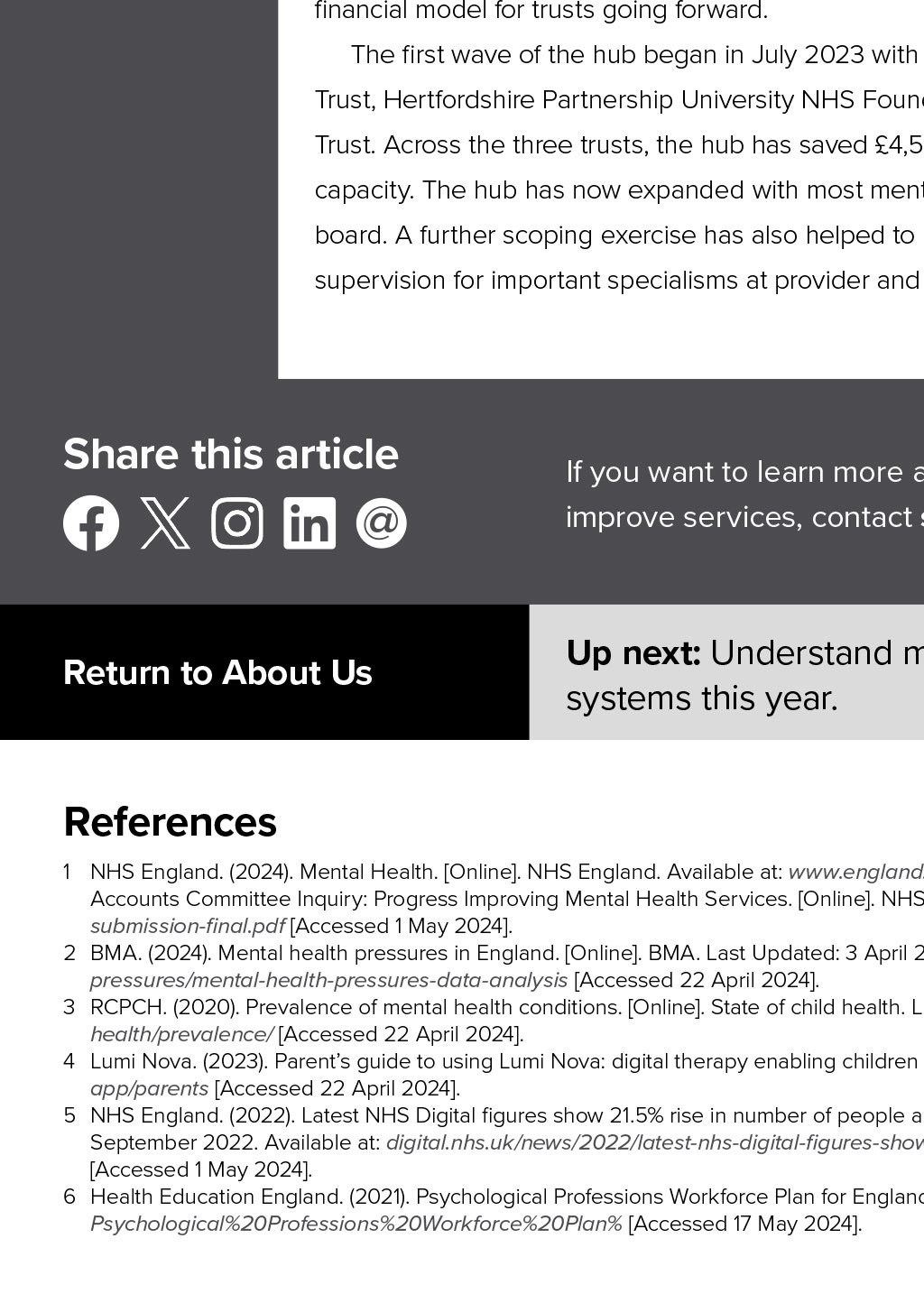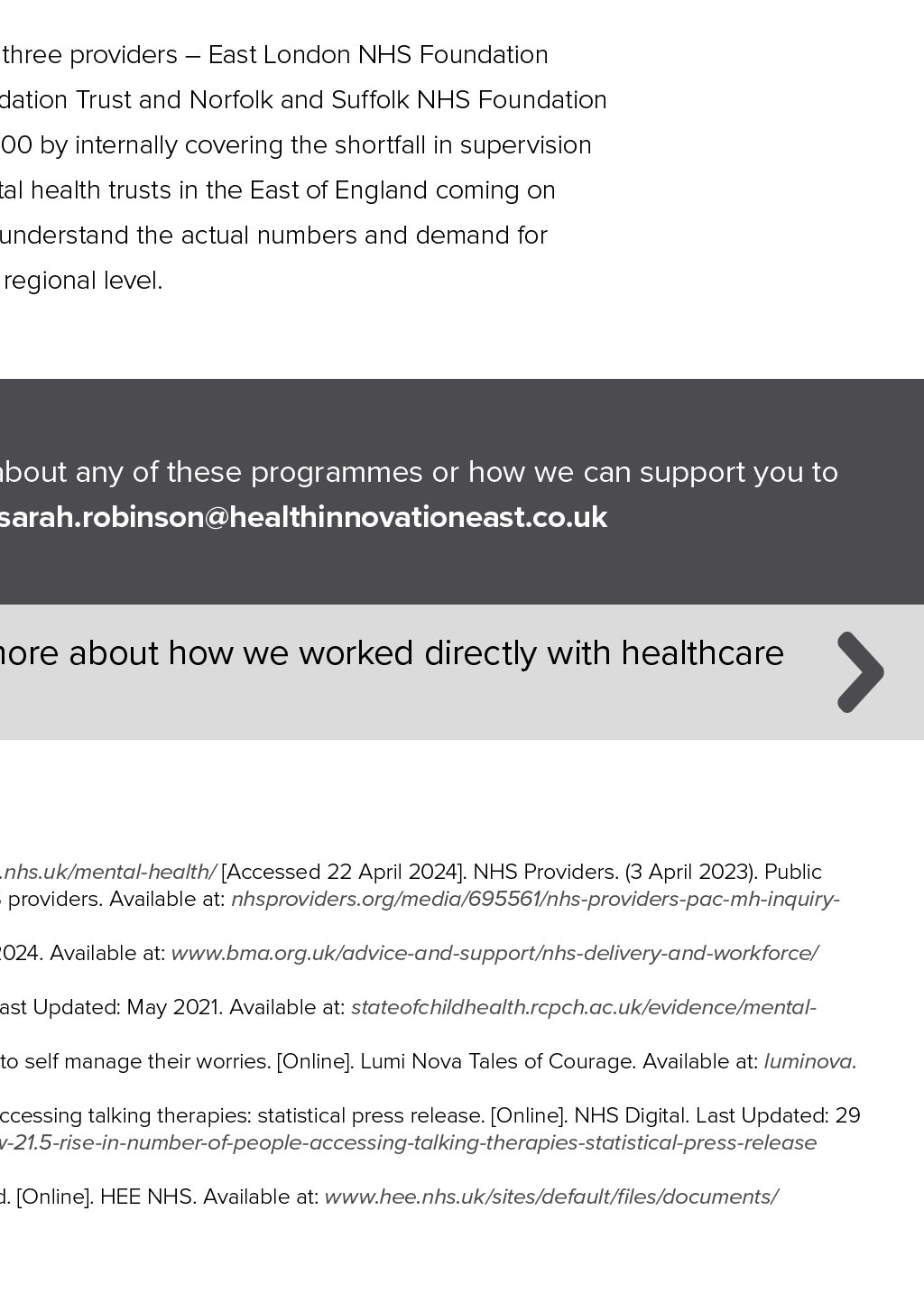




























Improving psychological wellbeing with increased access to support Dr Sarah Robinson, Director of Delivery at Health Innovation East, shares how we are supporting new service models and technologies to improve mental health outcomes. The number of people experiencing and reporting mental health symptoms is rising. One in four adults and one in 10 children are currently experiencing mental ill health in the UK (2). Although more people are accessing mental health care and treatment than ever before, mental health services in England received a record five million referrals during 2023, a 33% increase from 2019 (3). For children and young people, evidence suggests rates of mental ill health may be growing faster than among adults. It has been reported that between 2017 and 2022, rates of probable mental disorder increased from around one in eight young people aged 7-16 to more than one in six (3). Early intervention means that people get the care they need and it reduces the impact of their symptoms. The sooner we can provide education or an intervention, the greater the chance of preventing long-term problems. We have actively supported major programmes to address issues such as ADHD and eating disorders in young people in the past three years. Here we report on three recent projects where new service models and technologies are being deployed, two of which support children and young people in innovative ways. Providing information and resources to support neurodivergent children Supporting neurodivergent children and young people (CYP) is a priority area for Hertfordshires health and care system, with a rising number of assessment requests being made and growing demands for information, advice and guidance for parents and carers of neurodivergent children. A specialist support hub, run by Hertfordshire based charity, ADD-vance (the ADHD and Autism Trust) on behalf of Hertfordshire County Council (HCC), has been providing pre- and post-diagnostic support for CYP and their parents or carers. We were commissioned to evaluate the support service, with the evaluation overseen by HCC and the Hertfordshire Mental Health Learning Disability and Autism Health and Care Partnership (MHLDA). The evaluation showed a consistent rise in calls to the hub helpline with an increase from 113 to 186 monthly calls from May 2022 to November 2023. Positive user feedback highlighted the value of engaging with professionals who have first-hand experience. The support and assistance provided was found to improve parents psychological wellbeing. Feedback from parents and carers credited helpline staff and the hubs online courses for teaching valuable skills. They also reported that the young persons life was positively impacted, family dynamics were improved and there was a reduced reliance on additional services. Overcoming anxiety in children Research shows that half of all mental health problems start before the age of 14. Early intervention is crucial in preventing mental health problems from becoming lifelong (3). Lumi Nova is a therapeutic digital intervention for reducing childhood anxiety, developed by BfB Labs. Created as an immersive mobile game, Lumi Nova uses two aspects of Cognitive Behavioural Therapy (CBT) psychoeducation and exposure therapy, to help children aged 7-12 years old facing difficulties with anxiety (4). Additionally, Health Innovation East, Norfolk and Suffolk NHS Foundation Trust (NSFT) and BfB Labs won the outstanding contribution to population health through innovation award at the Innovate Awards 2023. We were co-applications with NSFT and BfB Labs on a successful grant application for 150k from the National Institute for Health and Care Research, through its Invention for Innovation (i4i) programme to support a real-world evaluation of Lumi Nova. We also worked with NSFT to host workshops to gain perspectives from digital developers, parents, clinicians and academics around further development of Lumi Nova. Here we co-led an exercise to build consensus on how to bridge the gap between developing digital health technology and implementing it. Embedding digital support into standard care pathways has the potential to improve access and outcomes in childrens mental health, as such, Lumi Nova has been recommended for childhood anxiety and low mood by the UKs National Institute for Health and Care Excellence (NICE). Read the full impact story I didnt think I would be able to overcome my fear, but I think I have! Its helped me feel like if I do have another fear then I can easily overcome it by setting myself challenges. Its a really good game. I dont think I would have been able to have done it without. 10-year-old Ruby Lumi Nova user Expanding training for psychological therapies There is a growing demand for psychological therapies to help support people with severe mental health problems (5). Severe mental health problems encompass disorders such as psychosis, bipolar disorder, personality disorders and eating disorders. Psychological therapies for people with severe mental health problems are a key part of the integrated offer for adults, as set out in the NHS Long Term Plan. While there is a greater demand for psychological therapies, health and care services are currently facing challenges in recruiting therapists to provide these services. An increase in training opportunities is needed to meet current and future demand. Action to uplift capacity is under way in health and care, but the time required to train therapists is significant (6). This year, to support an increase in capacity, we were commissioned by NHS England East Regional Mental Health Team to implement a regional hub for the provision of clinical supervision for psychological therapists. Health Innovation East undertook a capacity and demand exercise to understand the availability of clinical supervisors and in doing so unlocked flexible access to clinical supervision and made more specialist modality supervision expertise available across the region. As a part of the hub, providers offer up their spare supervision time to increase overall supervision capacity, and other providers utilise the capacity offered - all within the NHS. The arrangement also provides the opportunity for sharing learning and the perspectives of other professionals, and will provide a more sustainable financial model for trusts going forward. The first wave of the hub began in July 2023 with three providers East London NHS Foundation Trust, Hertfordshire Partnership University NHS Foundation Trust and Norfolk and Suffolk NHS Foundation Trust. Across the three trusts, the hub has saved 4,500 by internally covering the shortfall in supervision capacity. The hub has now expanded with most mental health trusts in the East of England coming on board. A further scoping exercise has also helped to understand the actual numbers and demand for supervision for important specialisms at provider and regional level. Share this article Return to About Us If you want to learn more about any of these programmes or how we can support you to improve services, contact sarah.robinson@healthinnovationeast.co.uk Up next: Understand more about how we worked directly with healthcare systems this year. References 1 NHS England. (2024). Mental Health. [Online]. NHS England. Available at: www.england.nhs.uk/mental-health/ [Accessed 22 April 2024]. NHS Providers. (3 April 2023). Public Accounts Committee Inquiry: Progress Improving Mental Health Services. [Online]. NHS providers. Available at: nhsproviders.org/media/695561/nhs-providers-pac-mh-inquirysubmission-final.pdf [Accessed 1 May 2024]. 2 BMA. (2024). Mental health pressures in England. [Online]. BMA. Last Updated: 3 April 2024. Available at: www.bma.org.uk/advice-and-support/nhs-delivery-and-workforce/ pressures/mental-health-pressures-data-analysis [Accessed 22 April 2024]. 3 RCPCH. (2020). Prevalence of mental health conditions. [Online]. State of child health. Last Updated: May 2021. Available at: stateofchildhealth.rcpch.ac.uk/evidence/mentalhealth/prevalence/ [Accessed 22 April 2024]. 4 Lumi Nova. (2023). Parents guide to using Lumi Nova: digital therapy enabling children to self manage their worries. [Online]. Lumi Nova Tales of Courage. Available at: luminova. app/parents [Accessed 22 April 2024]. 5 NHS England. (2022). Latest NHS Digital figures show 21.5% rise in number of people accessing talking therapies: statistical press release. [Online]. NHS Digital. Last Updated: 29 September 2022. Available at: digital.nhs.uk/news/2022/latest-nhs-digital-figures-show-21.5-rise-in-number-of-people-accessing-talking-therapies-statistical-press-release [Accessed 1 May 2024]. 6 Health Education England. (2021). Psychological Professions Workforce Plan for England. [Online]. HEE NHS. Available at: www.hee.nhs.uk/sites/default/files/documents/ Psychological%20Professions%20Workforce%20Plan% [Accessed 17 May 2024].